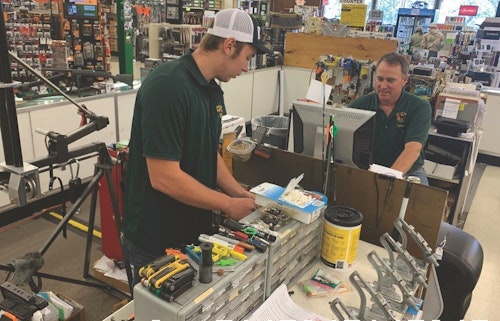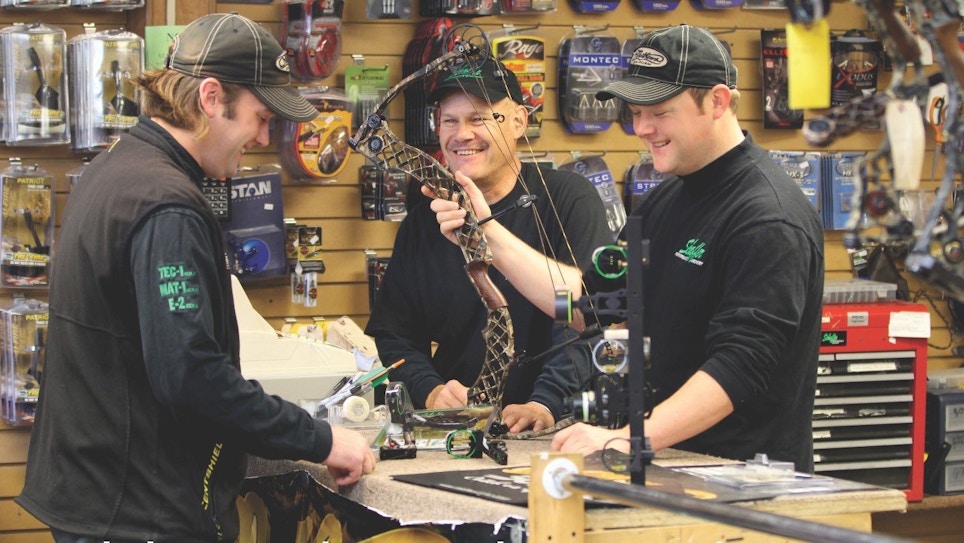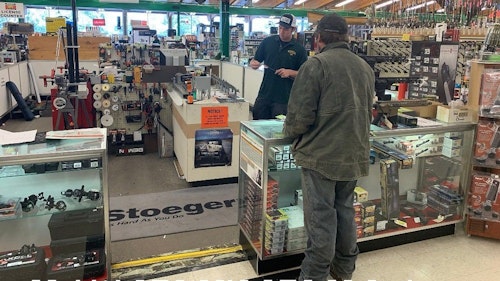Attempting to do everything yourself is the fastest way, I believe, to burn out in a retail business. Every successful archery store has so many facets to oversee and wearing every hat can put you behind on work, grind you down and crush your passion and optimism. This vicious cycle leads nowhere good.
Yes, it’s often easier to quickly address tasks yourself than explain how to do them to your employees. But, you short sell yourself every time you do that. Sure, it’s easier now, but in the long run, you’ll waste valuable time that you could otherwise devote to more important matters. Then, you’ll often mutter something like this, “There isn’t enough time in a day.” In reality, you simply need to manage your time and throw the ball to a teammate.
Try to see it this way: You’re the head coach and your employees are the team. A football head coach doesn’t snap the ball to himself, pass it and then run downfield and catch it. No, he teaches the team the anatomy of each individual play in the playbook so they can do it together. Then, when a given play is called during a live game, team members know their individual responsibilities.
To that end, being a good store owner or manager hinges on your ability to teach, instruct and delegate. If you can’t do those things, then you’ll always be chasing your tail and feel like you don’t have time. Learn to loosen your grip on the reins and empower your team to tackle responsibilities.
You can try hard to do everything yourself, but it’s a downward spiral. It takes a team to run a top-notch business. But, finding employees who collaborate well and share your passion and expertise isn’t easy. Servicing and selling archery equipment is intricate and involved work that few people truly understand, especially at the level it takes to satisfy customers.
Let’s discuss some ways to assemble a team that collaborates well and works efficiently.

Where to Look for Candidates
Finding good help is difficult. Few people among the general public share your level of expertise. However, you’ll find in working with your customers that a select few are very particular with their equipment and are well educated on how to do their own bow work. Maybe they don’t know as much as you, but they know a lot. You might consider offering such folks a position on the team. Taking them under your wing could prove far more manageable than starting with someone completely green who has little to no expertise with archery gear.
Another place to look is your family, especially if you collaborate well with your family members. I understand that some family members don’t work well together, so don’t force it. This is especially true if you both have strong leadership traits. You don’t want too many cooks in the kitchen; you need at least some team members who are followers, or it will be challenging to work together.
Of course, taking applications could yield candidates whom you can form and mold into good employees, but if they have little or no archery experience, it might be too steep a challenge to teach them the ins and outs required to become crucial employees.
One of the most significant challenges my family had whenever we tried to recruit help for our archery shop was finding someone with expertise who was willing to make less money than they were making at their current job. Our shop was located in a modest town of 8,000 to 9,000 people, so our revenues didn’t allow us to pay lucrative full-time salaries. If you’re operating in a small town, I understand your dilemma.
Teaching + Patience = Top Team Members
Do you tend to blow a gasket when an employee underperforms or makes a mistake, or do you objectively review the problem with your employee and then follow up with some coaching on how to avoid the hiccup in the future? If you have a short fuse and react angrily, you’ll make flighty employees and your staff will likely become a revolving door — this is bad for your business. Your customers want to work with the same people every time they visit your archery store; if they continuously get someone new, they’ll never be able to develop trust with your team.
So, don’t make employees skittish by blowing up. Review mistakes objectively and treat your employees as friends. Exercise patience and remember that your employees are only human, just like you. You can then cultivate a work environment that will keep your employees happy for years. Further, your customers will be welcomed to familiar faces every time they visit, and trust can begin to form.
Teamwork Creates Efficiency
When your team collaborates, operating procedures are handled much more efficiently and professionally. If your team doesn’t work together, things can get mixed up, and confusion makes it nearly impossible to operate efficiently. Suppose employee A creates a layaway for a customer on Monday. In that case, employee B should know precisely what to do when that customer returns a month later to pay off the item and take it home. If not, time will be wasted when employee B frantically tries to determine how much money was paid down on the item or where the item is stashed, etc. Imagine the wasted time and needless anxiety that results if this happens regularly.
How can you beat this and work efficiently? Collaboration is key. However, that sort of all-hands-on-deck commitment doesn’t happen by chance. Not only must you teach your team to collaborate, but you might even consider incentives that reward solid teamwork.
Have Regular Meetings
Does a football coach call his team together for the first time on opening night? No. The team practices for weeks and months, learning the ins and outs and ultimately learning collaborative techniques. Then, when it’s time, everyone knows what’s expected and how to perform when it counts.
Few retailers take the time to regularly meet with their teams outside of work hours. Even a brief weekly meeting, though, can lay the foundation for a successful week. It’s time to set goals, address challenges and fix mistakes, it’s also an excellent time to brainstorm and create practices that solidify collaboration.
Make and Meet Goals
To get somewhere you’ve never been to before, you need a map. Goals are like that, too. If you don’t make them, you won’t know where you’re going nor how to get there.
Sit down with your team to make goals and timeframes in which to achieve them. As time goes by, evaluate progress made and try to determine if you’re on track. Consider the following to help achieve your goals.
- Assess current operating procedures and discuss possible changes.
- Convert those changes to goals.
- Set realistic timeframes in which to meet your goals.
- Plan how each goal will be met and by whom.
- Evaluate the progress of each goal and make changes as necessary.
- Repeat.
Uncontrollable Factors Will Test Teamwork
No matter how prepared you feel, something you cannot control is bound to happen. A significant dispute over how an employee handled a transaction may throw a wrench into how the week was initially mapped out. Or, a large shipment might be delivered during the busiest time of the day. When uncontrollable things happen, you must address the situation promptly and professionally. Don’t let stress or disappointment carry through to your posture or tone.
I know a restaurant owner who has belittled employees in front of other customers and me on multiple occasions. There’s never been any yelling or anything like that, but rather than address the problem privately, she tends to do it out loud in front of everyone. Imagine how stupid or sad her employees feel, especially during their first days on the job while they’re still green and learning the ropes.
Customers will appreciate seeing friendly interactions amongst your team. Treating one another respectfully and sincerely shows your customers that your team works together and values one another. Plus, you don’t waste valuable time figuring out who did what. Address the uncontrollable factor and move forward.
Communication Is a Priority
One of the most important attributes your retail team can foster is good communication.
Suppose a customer wants to order a bow that you don’t currently have in stock. The employee who takes the order must give the details to the person who handles purchasing, but they also must follow up to make sure the order was placed. Likewise, suppose a customer who dropped a bow off for string-and-cable replacement calls back to add a fall-away rest to the work order. In that case, the information must be relayed to the service technician before the string-and-cable replacement is performed. Failure to communicate as a team can result in ticked-off customers.
There are so many moving parts to a retail business. When you have a team, everyone must communicate well so that the chain doesn’t derail at a critical time.
Final Thoughts
As I said at the beginning of this article, doing everything yourself is the fast track toward burnout. If you want to maintain your passion for all things archery, you must bring on team members who share your passion, expertise and work ethic. Then, you must focus on creating a team-oriented work atmosphere by meeting with your team outside of business hours to delegate tasks so that you can find time to address the most important things.
A chain with one weak link will not withstand challenges. Contrarily, a strong retail team with no weak links — everyone working together toward common goals — will always find ways to persist when challenges arise. A collaborative retail team defeats challenges, maintains a team-oriented attitude and achieves goals. Owners and managers of archery retail stores can keep their heads above water for the long haul only when they’re backed up by a reliable team.
A great team lightens the workload and smooths out operations. If one thing is for sure, a retail store owner cannot complete all operating procedures alone. It takes a team!
Sidebar: Be a Leader
Without leadership, a team simply cannot function collaboratively. Leaders are responsible for delegating tasks and supervising productivity. A leader must empower those lower on the hierarchy to tackle tasks as a team.
Leadership Attributes:
- Confident
- Calm
- Enthusiastic
- Committed
- Focused
- Creative
- Assertive
- Able to delegate







